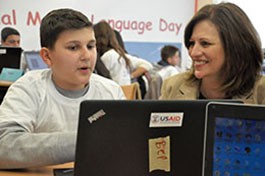
For Immediate Release
On Friday, Maureen A. Shauket, USAID/Kosovo Mission Director visited a celebration activity for International Mother Language Day at the “Green School” in Pristina. USAID’s Basic Education Program invited teachers and students of different communities from Kosovo to create together an e-book in their mother tongues. The activity took place inside the “21st century classroom” which was created with USAID support.
The stories that students wrote are based on the series of stories “The Global Sleepover” www.globalsleepover.com which are aimed at young children. These stories follow the sleepover characters as they travel the world and explore different places and cultures. There is a lack of stories for emerging young readers in Kosovo, so during this day, lower secondary students from different communities wrote stories in their mother tongue for younger students about a sleepover in their community. They used the characters of the “The Global Sleepover” and familiarized them with their own language and culture. At the end, the stories, accompanied by illustrations or images, were added to a single multi-language e-book, which was uploaded to www.libroteka.org, a website created by the USAID Basic Education Program, which gives opportunities to young writers to publish their work outside their school for a larger audience.
The purpose of this event is to encourage cross-cultural communication, promote literacy in different languages, and enhance students’ skills of writing, creativity, innovation, teamwork, information technology and research.
International Mother Language Day (IMLD) is observed every year since February 2000 to promote the richness of voices around the world. It was first promoted by UNESCO. The United Nations recognized the important role of language diversity in making 2008 the Year of International Languages. Countries that celebrate the day now determine a theme for each year and encourage all citizens to be involved.
International Mother Language Day reminds us of the value of our own language and culture. It also encourages celebration of the diverse heritage of people in the same country. It helps inspire understanding, inclusiveness, tolerance and dialogue among people.







Comment
Make a general inquiry or suggest an improvement.